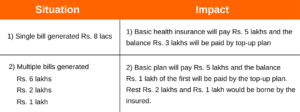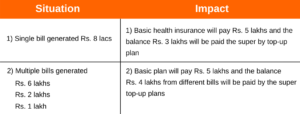June 29, 2021
Top Up vs Super Top Up Plans

Nisha Sanghavi
Founder, Fynomics and Co-founder, Promore Fintech Private Limited
Top-Up Plan
A top-up plan is a regular health insurance policy that covers hospitalization costs but only after a threshold limit (i.e. deductible), is crossed. It gives additional coverage, beyond the threshold limit of the existing health insurance policy in a single bill. The threshold limit can be met by a health insurance policy or by self-funding also. However, it is not mandatory to have a base policy to buy a Top-Up Mediclaim Policy. The policy can be issued on an Individual or Floater basis.
Here are some answers to commonly arising queries in this regard:
1) What is a deductible?
Deductible means the amount stated in the schedule which shall be borne by the insured in respect of each and every hospitalization claim incurred in the policy period. The company’s liability to make any payment for each and every claim under the policy is in excess of the deductible.
2) How is the deductible applied at the time of claim under Top Up Policy?
– Deductible would be applied afresh for each claim.
– Each and every hospitalization would be considered as a separate claim.
– The limit of indemnity /Sum Insured is the maximum liability above the deductible.
Example – Basic health insurance policy of Rs. 5 lacs and Top-up plan of Rs. 10 lacs, with a threshold of Rs. 5 lacs.

Super Top Up Plan
A super top-up plan covers the total of all hospitalization bills (up to the super top-up plan limit) above the deductible amount, that is, the deductible is applied to the total claims in a year. Hence, once the deductible is paid, the plan becomes active for subsequent claims. Similar to top-up plans, except that top-up plan covers a single claim above the threshold limit, while the super top-up plan covers the total of all hospitalization bills above the threshold limit.
Example – Basic health insurance policy of Rs. 5 lacs and Super Top-up plan of Rs. 10 lacs, with a threshold of Rs. 5 lacs.

So, while enhancing your health insurance, Super Top-up plans are the ideal way of doing it. Super Top-up plans are cost-effective and best when clubbed with the same insurance company as claim settlement becomes cashless under base + Super top-up policy when getting treated at a network hospital.
Here are some answers to commonly arising queries in this regard:
1) Can one only buy a Super Top Up Policy?
Yes keeping in mind the threshold (deductible) limit of the base policy or no policy allows you to buy only a Super Top Up Policy
2) Which points are to be kept in mind while buying a Super Top Up Policy?
Features like – Financial limits and sub-limits, Two Policies would mean two claims, waiting period, cashless network, buying both policy – base and super top-up in the same month or preferably on the same date.
3) Would the waiting period on Pre-existing disease be applied to a new Super Top Up Policy?
Yes, there would be a waiting period applicable as per policy terms and conditions.
4) How much deductible one should avail from a Top-up or a Super Top Up policy?
Under Top-Up Plans minimum deductibles available from Rs.30000 to Rs.10 lacs whereas under Super Top-up Plans minimum deductible available is from Rs.1 lac to Rs. 40 lacs. Generally, one should opt for a deductible equivalent to your base health policy or even less than that so that while a claim arises the deductible triggers early and the claim is settled. While you opt for a lesser deductible it would be a little expensive than the higher deductible.
Here’s hoping this article helped to clarify some thoughts and throw light on these two very useful options for your client’s risk management needs.
What do you normally suggest to your clients? Do share your ideas in the comments below.

Excellent article. In fact as you have rightly pointed out, having base cover and top up cover will be very handy during prolonged hosptialization as it can be claimed cashless instead of REIMBURSEMENT as one of the company might take more time to settle CASHLESS AUTHORIZATION (as it is done in stages during hospitalization) and the other company will insist for REIMBURSEMENT as they need to cross the threshold limit also!!
wonderful
Hi Nisha , this was quite an informative article . Thanks for sharing it
In short advisable to have super top up and not only top up
Awareness should be given to clients to buy Super Top up than Top Up along with Normal Health Insurance Policy. That’s the responsibility of the Advisors to make the client understand and realize the importance of buying a SUPER TOP UP. Nice explanation and easy to understand.
Basic with super top up is the ultimate solutions for family`s floter health plan
Thanks for sharing. The examples clarifies the concept.